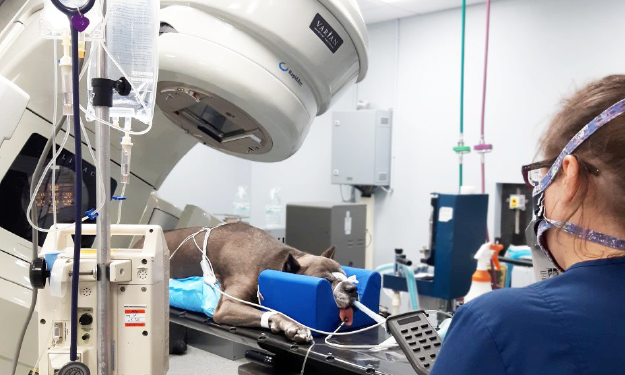Radiation Therapy for Dogs and Cats

Written by Staff Veterinarian
Cancer is one of the most common causes of sickness and death in pets, just as it is in people. Many people consider pets as family members and want to provide the same care they would their own children. Therapies once limited to human cancer patients, including chemotherapy and radiation, are now available for our companion animals.
Cancer treatment conjures images of illness and severe side effects, things that no one wants for their pet. Fortunately, our animal friends have fewer complications and a negative impact on quality of life is unlikely. Animals usually gain all the benefits from treatment with few of the downsides.
When Radiation is Used
Radiotherapy is used for many different cancers. It commonly applied when a tumor is removed and there is residual microscopic disease. Many cancers can be treated with radiation alone; even short courses of radiation can alleviate pain and slow disease progression.
A Typical Radiation Treatment Plan
Radiation is usually given in multiple doses over a few weeks. A typical treatment might involve a total of 16 doses given once daily for three weeks. Such therapy is “definitive” treatment and is used when long-term control or cure is possible. When pain control and comfort are the goals, we can use “palliative” therapy. This involves fewer doses, usually with several days between treatments. Both approaches are well-tolerated and can provide superior survival times while maintaining good quality of life.
Some patients may benefit from a very precise form of therapy known as CyberKnife®. This can deliver a definitive dose in just 1-3 treatments using a noninvasive, robotic delivery system for radiation therapy.
There is no single best treatment; that decision depends on many factors, including the type of cancer, its location, and the family’s goals for their pet.
Why Choose Radiation for Your Pet?
Radiotherapy is a flexible treatment that is useful for many cancers: as means of achieving cure, preserving quality of life, and providing comfort when nothing else can be done. Radiotherapy is not appropriate for all patients but it is becoming more commonplace for animal patients and is a major tool in our fight against cancer.